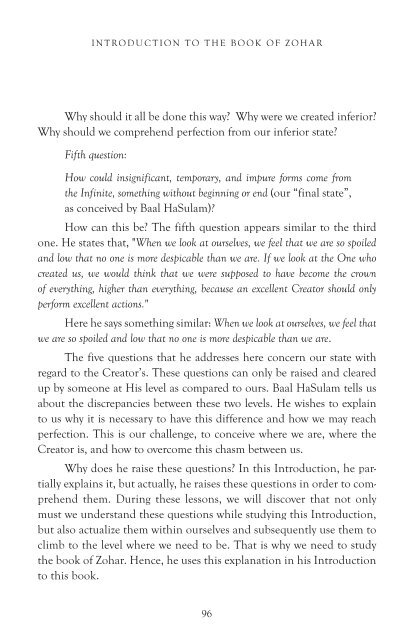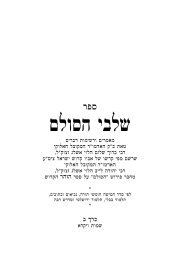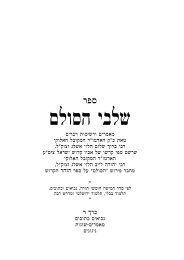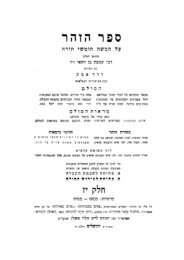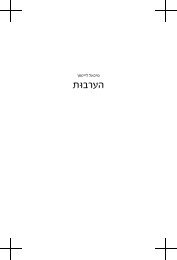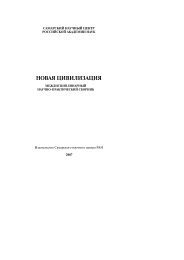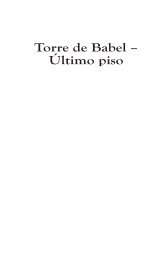- Page 3:
T H E L I G H T O F K A B B A L A H
- Page 6 and 7:
We wish to extend our gratitude to
- Page 9:
T O T H E R E A D E R For many cent
- Page 13 and 14:
PREFACE TO THE BOOK OF ZOHAR 1. The
- Page 15 and 16:
P R E FAC E T O T H E B O O K O F Z
- Page 17 and 18:
P R E FAC E T O T H E B O O K O F Z
- Page 19 and 20:
P R E FAC E T O T H E B O O K O F Z
- Page 21 and 22:
P R E FAC E T O T H E B O O K O F Z
- Page 23 and 24:
P R E FAC E T O T H E B O O K O F Z
- Page 25 and 26:
P R E FAC E T O T H E B O O K O F Z
- Page 27 and 28:
P R E FAC E T O T H E B O O K O F Z
- Page 29 and 30:
P R E FAC E T O T H E B O O K O F Z
- Page 31 and 32:
P R E FAC E T O T H E B O O K O F Z
- Page 33 and 34:
P R E FAC E T O T H E B O O K O F Z
- Page 35 and 36:
P R E FAC E T O T H E B O O K O F Z
- Page 37 and 38:
P R E FAC E T O T H E B O O K O F Z
- Page 39 and 40:
P R E FAC E T O T H E B O O K O F Z
- Page 41 and 42:
P R E FAC E T O T H E B O O K O F Z
- Page 43 and 44:
P R E FAC E T O T H E B O O K O F Z
- Page 45 and 46: P R E FAC E T O T H E B O O K O F Z
- Page 47 and 48: P R E FAC E T O T H E B O O K O F Z
- Page 49 and 50: P R E FAC E T O T H E B O O K O F Z
- Page 51 and 52: P R E FAC E T O T H E B O O K O F Z
- Page 53 and 54: P R E FAC E T O T H E B O O K O F Z
- Page 55 and 56: P R E FAC E T O T H E B O O K O F Z
- Page 57 and 58: P R E FAC E T O T H E B O O K O F Z
- Page 59 and 60: P R E FAC E T O T H E B O O K O F Z
- Page 61 and 62: P R E FAC E T O T H E B O O K O F Z
- Page 63 and 64: P R E FAC E T O T H E B O O K O F Z
- Page 65 and 66: P R E FAC E T O T H E B O O K O F Z
- Page 67 and 68: P R E FAC E T O T H E B O O K O F Z
- Page 69 and 70: P R E FAC E T O T H E B O O K O F Z
- Page 71 and 72: P R E FAC E T O T H E B O O K O F Z
- Page 73 and 74: P R E FAC E T O T H E B O O K O F Z
- Page 75 and 76: P R E FAC E T O T H E B O O K O F Z
- Page 77 and 78: P R E FAC E T O T H E B O O K O F Z
- Page 79 and 80: P R E FAC E T O T H E B O O K O F Z
- Page 81 and 82: P R E FAC E T O T H E B O O K O F Z
- Page 83 and 84: P R E FAC E T O T H E B O O K O F Z
- Page 85 and 86: P R E FAC E T O T H E B O O K O F Z
- Page 87 and 88: P R E FAC E T O T H E B O O K O F Z
- Page 89: P R E FAC E T O T H E B O O K O F Z
- Page 92 and 93: I N T RO D U C T I O N T O T H E B
- Page 94 and 95: I N T RO D U C T I O N T O T H E B
- Page 98 and 99: I N T RO D U C T I O N T O T H E B
- Page 100 and 101: I N T RO D U C T I O N T O T H E B
- Page 102 and 103: I N T RO D U C T I O N T O T H E B
- Page 104 and 105: I N T RO D U C T I O N T O T H E B
- Page 106 and 107: I N T RO D U C T I O N T O T H E B
- Page 108 and 109: I N T RO D U C T I O N T O T H E B
- Page 110 and 111: I N T RO D U C T I O N T O T H E B
- Page 112 and 113: I N T RO D U C T I O N T O T H E B
- Page 114 and 115: I N T RO D U C T I O N T O T H E B
- Page 116 and 117: I N T RO D U C T I O N T O T H E B
- Page 118 and 119: I N T RO D U C T I O N T O T H E B
- Page 120 and 121: I N T RO D U C T I O N T O T H E B
- Page 122 and 123: I N T RO D U C T I O N T O T H E B
- Page 124 and 125: I N T RO D U C T I O N T O T H E B
- Page 126 and 127: I N T RO D U C T I O N T O T H E B
- Page 128 and 129: I N T RO D U C T I O N T O T H E B
- Page 130 and 131: I N T RO D U C T I O N T O T H E B
- Page 132 and 133: I N T RO D U C T I O N T O T H E B
- Page 134 and 135: I N T RO D U C T I O N T O T H E B
- Page 136 and 137: I N T RO D U C T I O N T O T H E B
- Page 138 and 139: I N T RO D U C T I O N T O T H E B
- Page 140 and 141: I N T RO D U C T I O N T O T H E B
- Page 142 and 143: I N T RO D U C T I O N T O T H E B
- Page 144 and 145: I N T RO D U C T I O N T O T H E B
- Page 146 and 147:
I N T RO D U C T I O N T O T H E B
- Page 148 and 149:
I N T RO D U C T I O N T O T H E B
- Page 150 and 151:
I N T RO D U C T I O N T O T H E B
- Page 152 and 153:
I N T RO D U C T I O N T O T H E B
- Page 154 and 155:
I N T RO D U C T I O N T O T H E B
- Page 156 and 157:
I N T RO D U C T I O N T O T H E B
- Page 158 and 159:
I N T RO D U C T I O N T O T H E B
- Page 160 and 161:
I N T RO D U C T I O N T O T H E B
- Page 162 and 163:
I N T RO D U C T I O N T O T H E B
- Page 164 and 165:
I N T RO D U C T I O N T O T H E B
- Page 166 and 167:
I N T RO D U C T I O N T O T H E B
- Page 168 and 169:
I N T RO D U C T I O N T O T H E B
- Page 170 and 171:
I N T RO D U C T I O N T O T H E B
- Page 172 and 173:
I N T RO D U C T I O N T O T H E B
- Page 174 and 175:
I N T RO D U C T I O N T O T H E B
- Page 176 and 177:
I N T RO D U C T I O N T O T H E B
- Page 178 and 179:
I N T RO D U C T I O N T O T H E B
- Page 180 and 181:
I N T RO D U C T I O N T O T H E B
- Page 182 and 183:
I N T RO D U C T I O N T O T H E B
- Page 184 and 185:
I N T RO D U C T I O N T O T H E B
- Page 186 and 187:
I N T RO D U C T I O N T O T H E B
- Page 188 and 189:
I N T RO D U C T I O N T O T H E B
- Page 190 and 191:
I N T RO D U C T I O N T O T H E B
- Page 192 and 193:
I N T RO D U C T I O N T O T H E B
- Page 194 and 195:
I N T RO D U C T I O N T O T H E B
- Page 196 and 197:
I N T RO D U C T I O N T O T H E B
- Page 198 and 199:
I N T RO D U C T I O N T O T H E B
- Page 200 and 201:
I N T RO D U C T I O N T O T H E B
- Page 202 and 203:
I N T RO D U C T I O N T O T H E B
- Page 204 and 205:
I N T RO D U C T I O N T O T H E B
- Page 206 and 207:
I N T RO D U C T I O N T O T H E B
- Page 208 and 209:
I N T RO D U C T I O N T O T H E B
- Page 210 and 211:
I N T RO D U C T I O N T O T H E B
- Page 212 and 213:
I N T RO D U C T I O N T O T H E B
- Page 214 and 215:
I N T RO D U C T I O N T O T H E B
- Page 216 and 217:
I N T RO D U C T I O N T O T H E B
- Page 218 and 219:
I N T RO D U C T I O N T O T H E B
- Page 220 and 221:
I N T RO D U C T I O N T O T H E B
- Page 222 and 223:
I N T RO D U C T I O N T O T H E B
- Page 224 and 225:
I N T RO D U C T I O N T O T H E B
- Page 226 and 227:
I N T RO D U C T I O N T O T H E B
- Page 228 and 229:
I N T RO D U C T I O N T O T H E B
- Page 230 and 231:
I N T RO D U C T I O N T O T H E B
- Page 232 and 233:
I N T RO D U C T I O N T O T H E B
- Page 234 and 235:
I N T RO D U C T I O N T O T H E B
- Page 236 and 237:
I N T RO D U C T I O N T O T H E B
- Page 238 and 239:
I N T RO D U C T I O N T O T H E B
- Page 240 and 241:
I N T RO D U C T I O N T O T H E B
- Page 242 and 243:
I N T RO D U C T I O N T O T H E B
- Page 244 and 245:
I N T RO D U C T I O N T O T H E B
- Page 246 and 247:
I N T RO D U C T I O N T O T H E B
- Page 248 and 249:
I N T RO D U C T I O N T O T H E B
- Page 250 and 251:
I N T RO D U C T I O N T O T H E B
- Page 252 and 253:
I N T RO D U C T I O N T O T H E B
- Page 254 and 255:
I N T RO D U C T I O N T O T H E B
- Page 256 and 257:
I N T RO D U C T I O N T O T H E B
- Page 258 and 259:
I N T RO D U C T I O N T O T H E B
- Page 260 and 261:
I N T RO D U C T I O N T O T H E B
- Page 262 and 263:
I N T RO D U C T I O N T O T H E B
- Page 264 and 265:
I N T RO D U C T I O N T O T H E B
- Page 266 and 267:
I N T RO D U C T I O N T O T H E B
- Page 268 and 269:
I N T RO D U C T I O N T O T H E B
- Page 270 and 271:
I N T RO D U C T I O N T O T H E B
- Page 272 and 273:
I N T RO D U C T I O N T O T H E B
- Page 274 and 275:
I N T RO D U C T I O N T O T H E B
- Page 276 and 277:
I N T RO D U C T I O N T O T H E B
- Page 278 and 279:
I N T RO D U C T I O N T O T H E B
- Page 280 and 281:
I N T RO D U C T I O N T O T H E B
- Page 282 and 283:
I N T RO D U C T I O N T O T H E B
- Page 284 and 285:
I N T RO D U C T I O N T O T H E B
- Page 286 and 287:
I N T RO D U C T I O N T O T H E B
- Page 288 and 289:
I N T RO D U C T I O N T O T H E B
- Page 290 and 291:
I N T RO D U C T I O N T O T H E B
- Page 292 and 293:
I N T RO D U C T I O N T O T H E B
- Page 294 and 295:
I N T RO D U C T I O N T O T H E B
- Page 296 and 297:
I N T RO D U C T I O N T O T H E B
- Page 298 and 299:
I N T RO D U C T I O N T O T H E B
- Page 300 and 301:
for suffering and pleasure, for tho
- Page 302:
and takes control over one’s life


